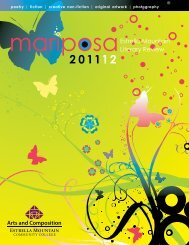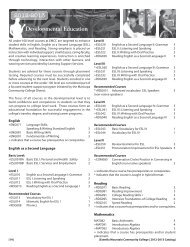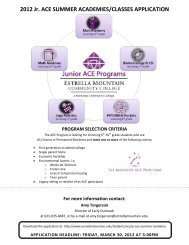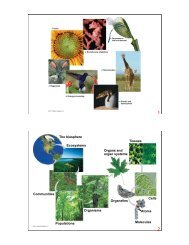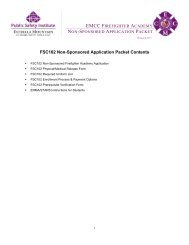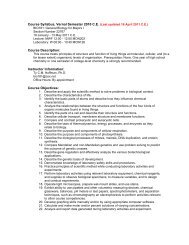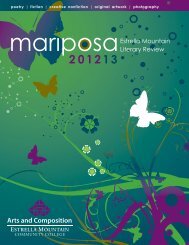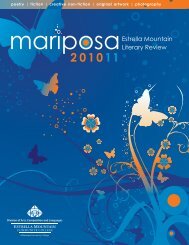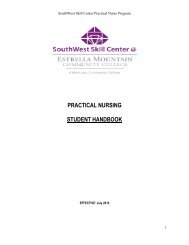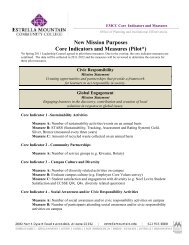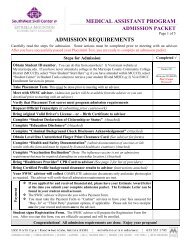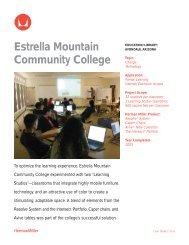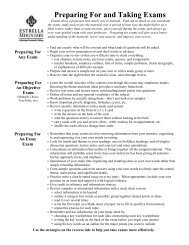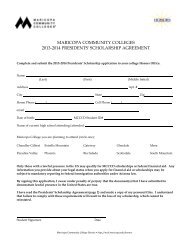MCCCD Policies and Procedures - Estrella Mountain Community ...
MCCCD Policies and Procedures - Estrella Mountain Community ...
MCCCD Policies and Procedures - Estrella Mountain Community ...
You also want an ePaper? Increase the reach of your titles
YUMPU automatically turns print PDFs into web optimized ePapers that Google loves.
<strong>MCCCD</strong> <strong>Policies</strong> <strong>and</strong> <strong>Procedures</strong><br />
iii. Information Processing: evaluation should assess specific information processing areas such as short‐ <strong>and</strong><br />
long‐term memory, sequential memory, auditory <strong>and</strong> visual perception/processing, processing speed,<br />
executive function, <strong>and</strong> motor ability.<br />
Examples of Achievement (including but not limited to):<br />
1. Wechsler Individual Achievement Tests (WIAT)<br />
2. Woodcock‐Johnson Psycho‐Educational Battery<br />
3. Stanford Test of Academic Skills (TASK)<br />
4. Scholastic Abilities Test for Adults (SATA)<br />
B. Diagnostic Report<br />
The diagnostic report must include the following information:<br />
i. A diagnostic interview that addresses relevant historical information, past <strong>and</strong> current academic<br />
achievement, instructional foundation, past performance in areas of difficulty, age at initial diagnosis, <strong>and</strong><br />
history of accommodations used in past educational settings <strong>and</strong> their effectiveness.<br />
ii. A list of all instruments used in the test battery.<br />
iii. Discussion of test behavior <strong>and</strong> specific test results.<br />
iv. A diagnostic summary or statement with the following information:<br />
1. DSM‐IV, including all five axes.<br />
2. A clear <strong>and</strong> direct statement that a learning disability does or does not exist, including a rule‐out of<br />
alternative explanations for the learning problems. Terms such as "appears," "suggests," or "probable"<br />
used in the diagnostic summary statement do not support a conclusive diagnosis.<br />
3. A clear statement specifying the substantial limitations to one or more major life activities.<br />
4. A psychometric summary of scores.<br />
5. A recommendation for accommodations, including rationale.<br />
Diagnosis of specific learning disabilities that do not contain psycho‐educational measures may not be sufficient<br />
for determining eligibility for academic accommodations. For example, school plans such as individualized<br />
education plans (IEP) or 504 plans may not be sufficient documentation. DRS reserves the right to request<br />
reassessment when questions regarding previous assessment or previous service provision arise.<br />
3. Attention Deficit Hyperactivity Disorder (ADHD) / Attention Deficit Disorder (ADD)<br />
A. Required Documentation<br />
Submit a current diagnosis of attention deficit hyperactivity disorder (ADHD)/attention deficit disorder (ADD)<br />
that is based on appropriate diagnostic evaluations.<br />
B. Diagnostic Report<br />
Acceptable documentation must include:<br />
i. DSM‐IV diagnosis, including all five axes<br />
ii. A summary or statement which includes the following information:<br />
iii. A clear summary or statement specifying evidence of behavior that significantly impairs functioning,<br />
including degree of severity.<br />
iv. A recommendation for accommodations, including rationale.<br />
4. Psychological/Psychiatric Disabilities<br />
A. Required Documentation<br />
i. Depression <strong>and</strong>/or bipolar disorder<br />
ii. Generalized anxiety disorders<br />
iii. Post traumatic stress disorder<br />
iv. Psychotic disorders<br />
v. Autism spectrum disorder.<br />
B. Diagnostic Report<br />
[<strong>Estrella</strong> <strong>Mountain</strong> <strong>Community</strong> College | 2012-2013 Catalog] [299]



